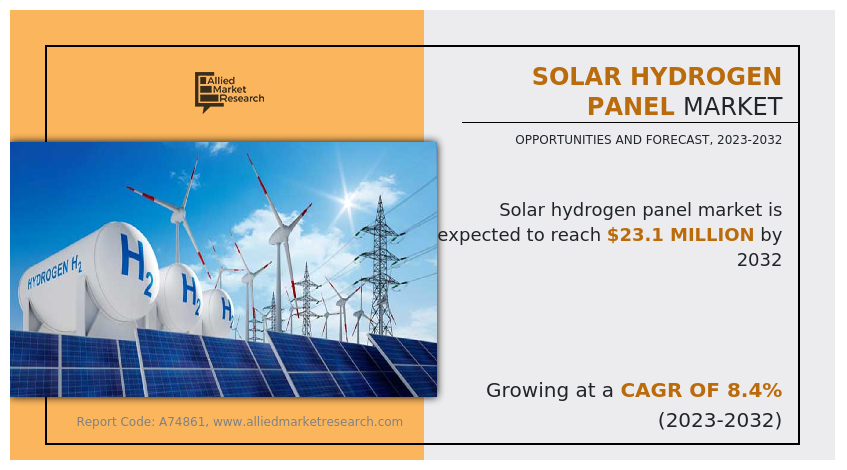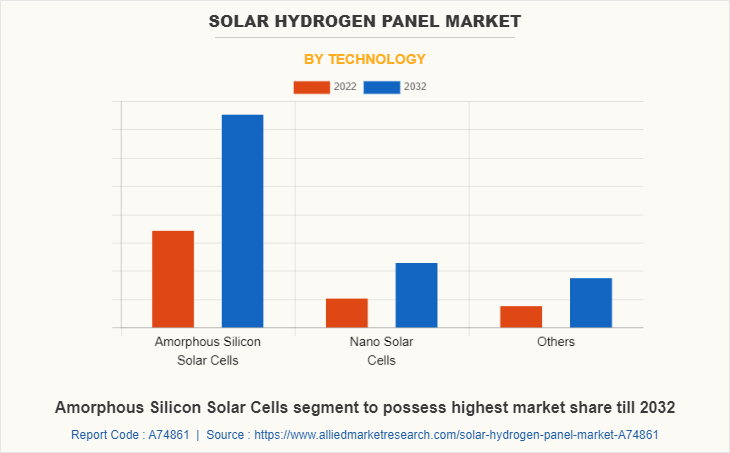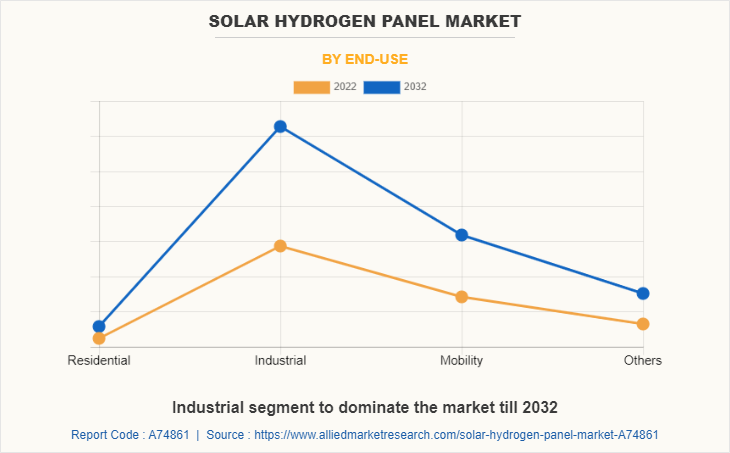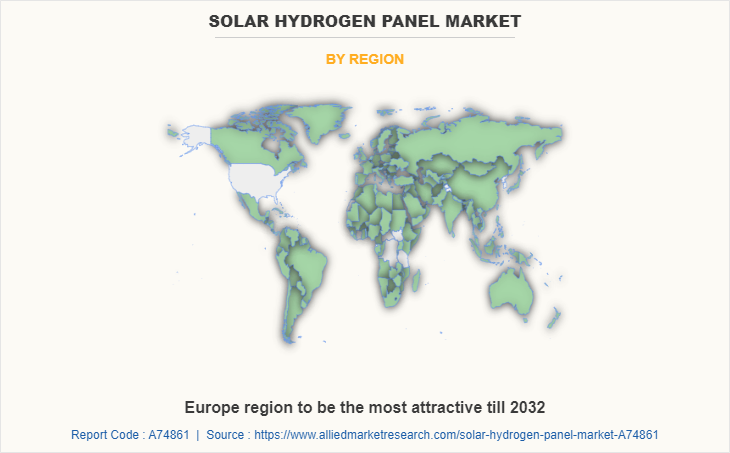Solar Hydrogen Panel Market Research, 2032
The global solar hydrogen panel market size was valued at $10.3 million in 2022, and solar hydrogen panel industry is projected to reach $23.1 million by 2032, growing at a CAGR of 8.4% from 2023 to 2032.

Solar hydrogen panel, also known as photovoltaic hydrogen system, combines solar energy technology with hydrogen production capabilities. These panels utilize sunlight to generate electricity through photovoltaic cells and simultaneously electrolyze water to produce hydrogen gas. This innovative technology offers a promising solution for sustainable energy production and storage, particularly in developing countries.
Solar hydrogen panels harness abundant and renewable energy of the sun, enabling the production of clean hydrogen fuel without releasing harmful greenhouse gases or contributing to climate change. This is of utmost importance for developing countries where the environmental impact of traditional energy sources is a growing concern.
The solar hydrogen panel market growth is driven by multiple factors; for instance, surge in energy demand coupled with the need for sustainable energy resources, which prompted global interest in harnessing hydrogen as a clean fuel alternative. Moreover, favorable government regulations promoting renewable energy and reducing dependency on fossil fuels contribute to the market growth. In addition, reduction of carbon footprint and increase in demand for low-cost energy generation create a conducive environment for the expansion of the solar hydrogen panel market.
However, challenges persist in the adoption of solar hydrogen panels in developing countries. One significant obstacle is the initial cost of installation and the infrastructure required for hydrogen storage and distribution. These factors act as substantial barriers, particularly in areas with limited financial resources and inadequate hydrogen infrastructure. However, as with solar energy, advancements in technology and economies of scale are expected to drive down costs and make solar hydrogen panels more accessible.
In addition, lack of technical expertise and training to maintain and operate solar hydrogen systems effectively acts as a key deterrent factor of the global market. Addressing this challenge requires investments in education, training programs, and knowledge-sharing initiatives to build local capacity and empower communities to take ownership of their solar hydrogen panel installations.
Despite the obstacles, the solar hydrogen panel market holds high growth potential in developing countries. This is attributed to the fact that the ability to generate electricity and produce hydrogen fuel simultaneously makes these panels a suitable option for regions with limited access to electricity and unreliable energy sources. By adopting solar hydrogen panels, developing countries can enhance energy security, reduce reliance on expensive imported fuels, and improve the socio-economic conditions of their communities.
"Solar Hydrogen Panels: A Renewable Energy Game-Changer"
Solar hydrogen panels have emerged as a revolutionary technology in the field of renewable energy, holding the potential to transform the way electricity is generated and stored. These panels utilize sunlight to split water molecules into hydrogen and oxygen through a process called electrolysis. The hydrogen produced can then be stored and used as a clean and sustainable energy source.
One of the major advantages of solar hydrogen panels is their ability to provide a continuous and reliable source of energy. Unlike traditional solar panels that rely on direct sunlight to generate electricity, solar hydrogen panels can produce hydrogen even on cloudy days or during night. This makes them an ideal solution for regions with fluctuating weather patterns or limited sunlight.
Moreover, solar hydrogen panels offer a versatile energy storage solution. The generated hydrogen can be stored and used in various applications, such as fuel cells for transportation, backup power systems, or industrial processes. For instance, hydrogen fuel cells can power electric vehicles, providing a zero-emission alternative to fossil fuels. This not only reduces carbon emissions but also helps in mitigating the impacts of climate change.Several notable examples highlight the potential of solar hydrogen panels. The HyStation in Berlin, Germany, utilizes solar hydrogen panels to produce hydrogen on-site, which is then used to fuel hydrogen-powered vehicles. Similarly, the SmartSolarH2 project in the Netherlands integrates solar hydrogen panels with electrolyzers to power homes and vehicles, creating a self-sufficient and sustainable energy ecosystem.
"Solar Hydrogen Panels: Pioneering the Path to Clean Energy Independence"
Solar hydrogen panels are emerging as a revolutionary technology, pioneering the path to clean energy independence. Combining the power of solar energy and hydrogen production, these panels offer a promising solution to address the world's growing energy needs while reducing carbon emissions. By utilizing sunlight to split water molecules into hydrogen and oxygen, solar hydrogen panels provide a sustainable and renewable source of clean fuel.One of the significant advantages of solar hydrogen panels is their ability to store excess energy. While traditional solar panels generate electricity directly, solar hydrogen panels convert solar energy into hydrogen gas, which can be stored and used later for various applications.
This storage capability addresses one of the major challenges of renewable energy source’s intermittency by providing a reliable and efficient energy storage solution.Moreover, solar hydrogen panels offer numerous applications; for instance, they can power hydrogen fuel cell vehicles, eliminating the dependence on fossil fuels and reducing greenhouse gas emissions. In addition, solar hydrogen panels can be used for industrial processes such as hydrogenation, refineries, and ammonia production. They can even serve as a backup power source for residential and commercial buildings, ensuring an uninterrupted energy supply.
Notable examples of solar hydrogen panel projects include the Hydrogenics Power-to-Gas plant in Germany, which utilizes excess renewable energy to produce hydrogen for injection into the natural gas grid. Another remarkable initiative is the "Hydrogen Valley" project in Denmark, where a solar-powered hydrogen production facility supports zero-emission transportation and energy storage.As solar hydrogen panel technology continues to develop and gain traction, it holds the potential to transform energy landscape. By pioneering the path to clean energy independence, these panels pave the way for a sustainable future with reduced reliance on fossil fuels and a significant reduction in carbon emissions.
The global solar hydrogen panel market forecast is segmented into technology, end use, and region. On the basis of technology, the market is divided into amorphous silicon solar cells, nano solar cells, and others. Depending on end use, it is segregated into residential, industrial, mobility, and others. Region wise, the market is studied across North America, Europe, Asia-Pacific, and LAMEA and suggests future growth opportunities.

On the basis of technology, the amorphous silicon segment emerged as the global leader by acquiring two-third of the solar hydrogen panel market share in 2022 and is anticipated to continue this trend during the forecast period. Increase in demand for renewable energy sources and rise in emphasis on sustainable practices notably contribute toward the market growth. As the world recognizes the need to reduce greenhouse gas emissions and transition toward cleaner energy alternatives, the adoption of solar hydrogen panels using amorphous silicon solar cells is gaining momentum.

On the basis of end-use, the industrial segment emerged as the largest market share in 2022 which accounts more than half of the solar hydrogen panel market share and is anticipated to continue this trend during the forecast period. The industrial sector is emerging as a key end-use segment in the solar hydrogen panel market, witnessing significant growth and presenting numerous opportunities. Increase in focus on sustainability and the transition toward cleaner energy sources prompted industries to explore renewable alternatives to traditional fossil fuel-based energy systems.

On the basis of region, Europe is the major consumer of solar energy among other regions. It accounted for more than two-fifths of the global market shares in 2022. The solar hydrogen panel market in Europe is experiencing significant growth and offers promising opportunities. This is attributed to Europe's focus on renewable energy and the transition to a low-carbon economy, which is driving the demand for solar hydrogen panels.
Impact of Russia–Ukraine War on Global Solar Hydrogen Panel Market
The ongoing conflict between Russia and Ukraine has led to political and economic instability in the region, which will have implications for the solar hydrogen panel market. Ukraine is a significant producer of solar hydrogen panels, and any disruption to its supply chains will have a ripple effect on the global market. In addition, the conflict will lead to increase in energy prices and decrease in investments in renewable energy projects in Europe.
Impact of Bankruptcy of U.S. Banks on Global Solar Hydrogen Panel Market
The potential bankruptcy of U.S. banks has an impact on the solar hydrogen panel market. Banks play a critical role in financing renewable energy projects, and decrease in funding will slow down the growth of the market. However, there are many other sources of financing for renewable energy projects, including private investors, government incentives, and international organizations, which will support the development of the market.
Impact of Problems in Europe and Other Countries on Global Solar Hydrogen Panel Market
The problems in Europe and other countries, such as economic instability, political uncertainty, and environmental concerns, will have both positive and negative impacts on the solar hydrogen panel market.
For instance, these challenges lead to an increased focus on renewable energy and a greater demand for solar hydrogen panels. On the other hand, the challenges will lead to decrease in funding for renewable energy projects and slowdown in the market growth.
Competitive Landscape
The report features the strategies adopted by key market players to maintain their foothold in the market. Furthermore, it highlights the competitive landscape of the key players to increase their market share and sustain the intense competition in the industry. SunHydrogen, HyperSolar, Proton OnSite, Sunfire GmbH, Nel Hydrogen, Enapter, Solhyd, Schmid Group, Suzhou GH New Energy Co Ltd, and Flux50 are some of the major players discussed in the report. Furthermore, the key strategies adopted by potential market leaders to facilitate effective planning have been discussed under the scope of the report.
Key Benefits For Stakeholders
- This report provides a quantitative analysis of the market segments, current trends, estimations, and dynamics of the solar hydrogen panel market analysis from 2022 to 2032 to identify the prevailing solar hydrogen panel market opportunities.
- The market research is offered along with information related to key drivers, restraints, and opportunities.
- Porter's five forces analysis highlights the potency of buyers and suppliers to enable stakeholders make profit-oriented business decisions and strengthen their supplier-buyer network.
- In-depth analysis of the solar hydrogen panel market segmentation assists to determine the prevailing market opportunities.
- Major countries in each region are mapped according to their revenue contribution to the global market.
- Market player positioning facilitates benchmarking and provides a clear understanding of the present position of the market players.
- The report includes the analysis of the regional as well as global solar hydrogen panel market trends, key players, market segments, application areas, and market growth strategies.
Solar Hydrogen Panel Market Report Highlights
| Aspects | Details |
| Market Size By 2032 | USD 23.1 million |
| Growth Rate | CAGR of 8.4% |
| Forecast period | 2022 - 2032 |
| Report Pages | 241 |
| By Technology |
|
| By End-Use |
|
| By Region |
|
| Key Market Players | HyperSolar, Sunfire GmbH, Flux50, Suzhou GH New Energy Co. Ltd., Schmid Group, SunHydrogen, Nel Hydrogen, Solhyd, Proton Onsite, Enapter |
Analyst Review
According to CXO perspective, solar hydrogen panels are anticipated to gain high traction due to increase in awareness among individuals regarding the benefits of green energy and the efficient conversion of solar panels into hydrogen fuel. Solar hydrogen panels are increasingly preferred over other sources of electricity generation as they require minimal maintenance and produce zero pollution.
The CXOs further added that the solar hydrogen panel market is poised for rapid growth during the forecast period owing to increase in demand for clean electricity and government initiatives aimed at reducing CO2 emissions. Furthermore, a significant rise in awareness about renewable energy sources has led to rise in popularity of solar technology in recent years. In Asia-Pacific, the solar hydrogen panel market presents lucrative opportunities for key manufacturers due to swift adoption of solar technology to boost renewable energy production. Furthermore, China is actively enhancing its solar power infrastructure to address pollution concerns and expand its domestic manufacturing industry.
As per the insights of CXOs, escalating demand for electricity from the commercial and industrial sectors, particularly during peak hours, acts as a key driving force of the global solar hydrogen panel market. Major market players have responded to this demand by introducing advanced solar modules that prioritize efficiency, cost-effectiveness, and panel design, considering the increase in global demand for solar-based electricity. However, the substantial installation cost associated with solar hydrogen panels remains a significant barrier to market growth.
Increase in demand for clean energy and government support are the key factors boosting the Solar hydrogen panel market growth.
Surge in demand for hydrogen fuel cells is the Main Driver of Solar hydrogen panel Market.
SunHydrogen, HyperSolar, Proton OnSite, Sunfire GmbH, Nel Hydrogen, Enapter, Solhyd, Schmid Group, Suzhou GH New Energy Co Ltd, and Flux50
Industrial application is projected to increase the demand for Solar hydrogen panel Market
The global solar hydrogen panel market is segmented into technology, end use, and region. On the basis of technology, the market is divided into amorphous silicon solar cells, nano solar cells, and others. Depending on end use, it is segregated into residential, industrial, mobility, and others. Region wise, the market is studied across North America, Europe, Asia-Pacific, and LAMEA.
The market value of Solar hydrogen panel in 2032 is expected to be $23.1 million
Loading Table Of Content...
Loading Research Methodology...



